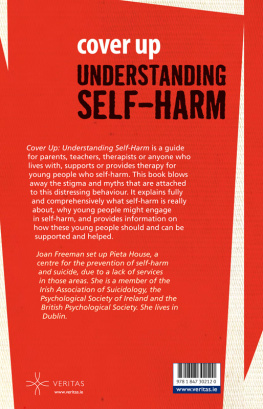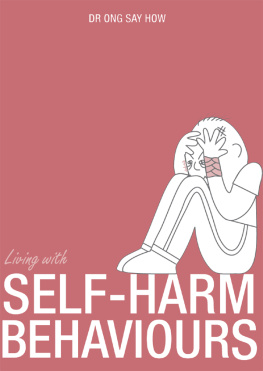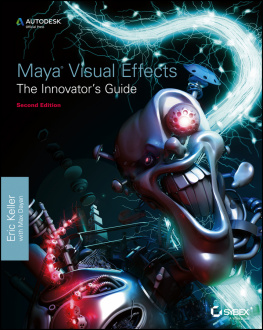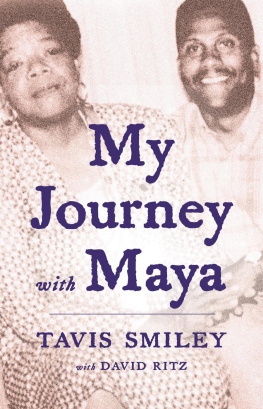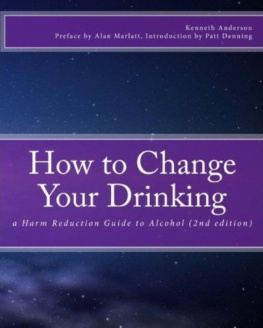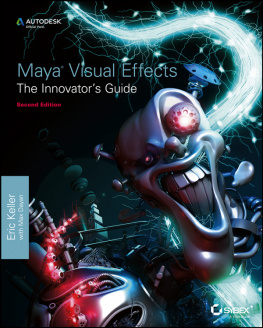Maya Dusenbery - Doing Harm
Here you can read online Maya Dusenbery - Doing Harm full text of the book (entire story) in english for free. Download pdf and epub, get meaning, cover and reviews about this ebook. year: 2018, publisher: HarperCollinspublishers, genre: Romance novel. Description of the work, (preface) as well as reviews are available. Best literature library LitArk.com created for fans of good reading and offers a wide selection of genres:
Romance novel
Science fiction
Adventure
Detective
Science
History
Home and family
Prose
Art
Politics
Computer
Non-fiction
Religion
Business
Children
Humor
Choose a favorite category and find really read worthwhile books. Enjoy immersion in the world of imagination, feel the emotions of the characters or learn something new for yourself, make an fascinating discovery.
- Book:Doing Harm
- Author:
- Publisher:HarperCollinspublishers
- Genre:
- Year:2018
- Rating:5 / 5
- Favourites:Add to favourites
- Your mark:
- 100
- 1
- 2
- 3
- 4
- 5
Doing Harm: summary, description and annotation
We offer to read an annotation, description, summary or preface (depends on what the author of the book "Doing Harm" wrote himself). If you haven't found the necessary information about the book — write in the comments, we will try to find it.
Doing Harm — read online for free the complete book (whole text) full work
Below is the text of the book, divided by pages. System saving the place of the last page read, allows you to conveniently read the book "Doing Harm" online for free, without having to search again every time where you left off. Put a bookmark, and you can go to the page where you finished reading at any time.
Font size:
Interval:
Bookmark:
For Martha and Lisa
A FEW YEARS AGO, I was diagnosed with rheumatoid arthritis. Illness, like love or grief or any other important aspect of human experience, is difficult to talk about without falling into clichs. One of the truest, in my opinion, is that your health is something you take for granted until you lose it. As someone who was healthy for twenty-seven years before becoming ill, I had come to expect that I could count on my body. It had always provided a comfortable, resilient home, one that, as a lifelong athlete, I felt a great deal of control over. Before, it was often a source of pleasure, and when it was in pain, it was a pain I chose willingly to make it stronger and faster. Most of the time, though, I forgot my body entirely. It was the loss of this luxury that I felt most acutely when my immune system started attacking my joints. Suddenly, I was always aware of my body; no matter what I was doing, some part of my attention was pulled to the constant aching in my knuckles and knees, and I deeply resented the intrusion.
When you get diagnosed with an autoimmune disease, especially if youre a woman of a certain age, its a lot like when you buy a new car and promptly start seeing the same make and model everywhere. Its estimated that as many as 50 million Americans suffer from autoimmune diseases, a class of diseases of which rheumatoid arthritis (RA) is just one, and rates are on the rise. Yet as I learned more about this epidemic, there seemed to be little awareness of it, both in the public and within the American medical system. Certainly, medicine seemed frustratingly short on answers. It couldnt tell me why my immune cells had suddenly turned against my own joints. It could offer only intense drugs that suppressed my entire immune system, caused my hair to fall out, and required regular monitoring of my liver. Most perplexingly, despite how common autoimmune diseases are, the medical system appeared to be remarkably bad at recognizing them. While I had been diagnosed with RA relatively quickly, I learned that many others werent nearly so lucky. According to a survey by the American Autoimmune Related Diseases Association (AARDA), it takes nearly four years and four doctors, on average, before a patient with an autoimmune disease is properly diagnosed. Nearly half report that before they were diagnosed, they were dismissed as chronic complainers who were overly concerned with their health.
As a feminist writer, I was inclined to think that this state of affairs might have something to do with the fact that women make up more than three-quarters of those with autoimmune diseases, while they constitute less than a third of practicing doctors in a medical system that has, until recently, been even more overwhelmingly male dominated. As someone whod written about reproductive rights for several years, I was hardly a stranger to thinking about womens health. But while I was well versed in the overt ways the politics of contraception and abortion affect access to reproductive health care, I didnt feel like I had a comprehensive understanding of how a more insidious gender biasborn of centuries in which biomedical knowledge was produced by menhas left its impact on the care that sick women receive today.
I realized that my relationship to the medical system, like my relationship to my own body, had been very much influenced by my status as a fairly healthy person. Just as Id had the luxury of not thinking very much about my body until it broke, Id also given little thought to how well the medical system was equipped to care for me if it did. Id always known, of course, that there were thousands of ways a body could break, but such theoretical possibilities dont matter much to an invincible twentysomething. Likewise, I knew, intellectually, that doctors and scientists are just fallible human beings, affected by the biases we all are, and that biomedical knowledge is incomplete. But as long as I didnt personally have much need of medicine, it was easy to not think about its limitations.
But once I started to think about them, I quickly realized that autoimmune disease isnt the only womens health problem that is comparatively neglected. Indeed, it felt like every disease that experts described as an overlooked, and often growing, epidemic disproportionately affects women. Women make up about two-thirds of people with Alzheimers disease, which experts now consider the third leading cause of death (after heart disease and cancer), though it receives only a fraction of the research dollars. Theyre at least twice as likely to have chronic pain conditions that affect 100 million American adults but that are woefully undertreated and under-researched. Then there are conditions like fibromyalgia, chronic fatigue syndrome, chronic Lyme disease, and multiple chemical sensitivities that are 70 to 80 percent female dominated and so poorly understood they have yet to be fully accepted as real diseases by the whole of the profession.
Meanwhile, I was somewhat surprised to realize that, apart from our reproductive health concerns, medicine pays little attention to potential differences between men and women, instead taking a one-size-fits-all approach to clinical research and practice. (Ironic, given that medicine, historically, had often declared women to be fundamentally different fromand inferior tomen.) For decades, that one size was specifically a seventy-kilogram white man; women of childbearing age were largely excluded from clinical research, particularly drug studies, altogether. While their numbers have increased since the early nineties, when federal law began requiring women and racial minorities to be included in research funded by the National Institutes of Health (NIH), we are still feeling the legacy of years of foundational research conducted on men, with the assumption that it could be extrapolated to women. And despite a wealth of evidence that has emerged over the past couple of decades showing that that was not a safe assumptionthat there are, in fact, plentiful differences between men and women in everything from drug responses to risk factors for various diseasesresearchers still dont routinely analyze and report such differences.
I also didnt have to look very far to find that it wasnt just women with autoimmune diseases who found that their symptoms initially werent taken seriously by health care providers. Just a quick survey of my own network revealed that women with a wide range of problems were similarly dismissed. For a month, multiple health care providers insisted that one friends stabbing chest pain was likely just anxiety before they realized it was pericarditis, an inflammation of the lining around the heart that causes symptoms similar to those of a heart attack. Two ob-gyns attributed the abdominal pain and incontinence of anothers ureaplasma infection to stress. When another friend complained of dizziness, wooziness, ringing in her ears, and floaters in her eyes, an infectious disease specialist suggested that she see a therapist; it turned out she had West Nile virus. The list went on.
Anecdotes like these abound on the Internet too. Often, womens symptoms are brushed off as the result of depression, anxiety, or the all-purpose favorite: stress. Sometimes, they are attributed to womens normal physiological states and cycles: to menstrual cramps, menopause, or even being a new mom. Sometimes, other aspects of their identity seem to take center stage: fat women report that any ailment is blamed on their weight; trans women find that all their symptoms are attributed to hormone therapy; black women are stereotyped as addicts looking for prescription drugs, their reports of pain doubted entirely. Whatever the particular attribution, there is often the same current of distrust: the sense that women are not very accurate judges of when something is really, truly wrong in their bodies.
Font size:
Interval:
Bookmark:
Similar books «Doing Harm»
Look at similar books to Doing Harm. We have selected literature similar in name and meaning in the hope of providing readers with more options to find new, interesting, not yet read works.
Discussion, reviews of the book Doing Harm and just readers' own opinions. Leave your comments, write what you think about the work, its meaning or the main characters. Specify what exactly you liked and what you didn't like, and why you think so.


